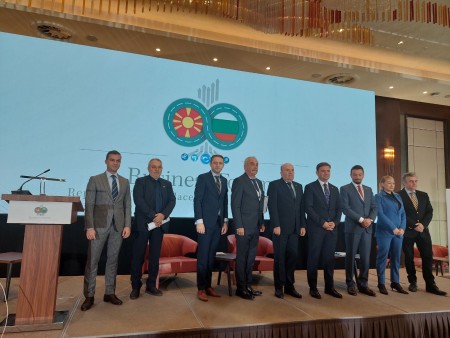Bilateral еnergy and infrastructure projects show potential for successful cooperation between Bulgaria and North Macedonia
Energy and infrastructure projects between Bulgaria and the Republic of North Macedonia show potential for achieving successful cooperation. This is a position which business representatives from the two countries agreed on during an economic forum in Skopje. Participating in the event were more than 150 business representatives of the two countries, officials of chambers of commerce and state institutions.
The President of the Macedonian-Bulgarian Chamber of Commerce Kiril Lazarov said that the agreement on electricity with Bulgaria is being finalized and should start being implemented soon. As of January 1, 2023, through the expanded capacity of the Kyustendil-Zhidilovo intersystem gas connection, there will be an opportunity to import greater quantities of natural gas from various suppliers.
Plamen Pavlov, President of the Bulgarian-Macedonian Chamber of Commerce and Industry shared that despite efforts over the past 4 years, the goals of the updated White Paper on cooperation and improvement of the business climate in bilateral relations have not been achieved. Plamen Pavlov brought up the idea of introducing one-stop-shop border checkups to facilitate border crossing. He noted that the forum in Skopje was a surprise with great attention, perfectly prepared hosts and well-intentioned media.
Bajram Redzepi, Executive Director of North Macedonia’s National Energy Resources, said that his country was extremely dependent on gas from Russia but now has the opportunity to get supplies from other countries as well. He outlined the idea for the Republic of North Macedonia to use capacity from Bulgaria’s Chiren underground gas storage facility and to purchase a share of the Alexandroupolis LNG terminal.
Representatives of both countries expressed mutual interest in the construction of the Petrich-Strumica interconnector, for which implementation exploration is planned to begin in 2023, in Redzepi’s words. North Macedonia is also exploring various options for connection and supplies through the Greek gas transmission network, he added.
Nikola Delev of Bulgartransgaz said that 2022 has shown the importance of the diversification of energy networks and the security of energy supplies. Well-developed infrastructure is an obligatory condition for diversified and secure energy supplies, he added. The agreement on intersystem connectivity increases the capacity for providing North Macedonia with gas by half a billion cubic metres a day and gives the country the option to access a big number of sources, suppliers, and counterparties, including through the Balkan Gas Hub.
Delev described as a project of particular importance for both countries the expansion of the Chiren gas storage facility, which is the only one in Southeastern Europe. The expansion should double its capacities for both storage and extraction.
An example of joint activity outside of big energy projects is that of Bulgaria’s Hec Solar company, which is developing a project for a photovoltaic power plant in the Republic of North Macedonia. The plant with two-sided solar panels is projected to have 90 MW power and go into operation in late 2023, said Neli Radulova, head of the project’s development at Hec Solar. The investment in the project is worth over EUR 58 million.
The participants in the forum reviewed the efforts for infrastructure connectivity between the two countries through the prism of the project to connect the railway systems of Bulgaria and North Macedonia as part of Corridor VIII’s development.
Railways of the Republic of North Macedonia head Hari Lokvenec underscored the importance of railway connections as a way to quickly and cheaply transport large freight quantities as well as to protect the environment. He also outlined the significance of connecting the railway systems for finalizing the connectivity within the Three Seas Initiative and providing a connection between the Mediterranean and the region of the Black Sea and the Bosphorus.
Lokvenec and Plamen Pesharov, manager of the monitoring department at Bulgarian State Railways, noted the monthly coordination meetings between teams of Bulgaria and North Macedonia whose work is directed at both strategic and technical matters.
Lokvenec called on Bulgarian companies to take part in the third phase of the Skopje-Sofia railway line project, which is currently in the preparation stage. He expressed the hope that this line will be finished by 2027 and the connection with Albania, by 2030.

